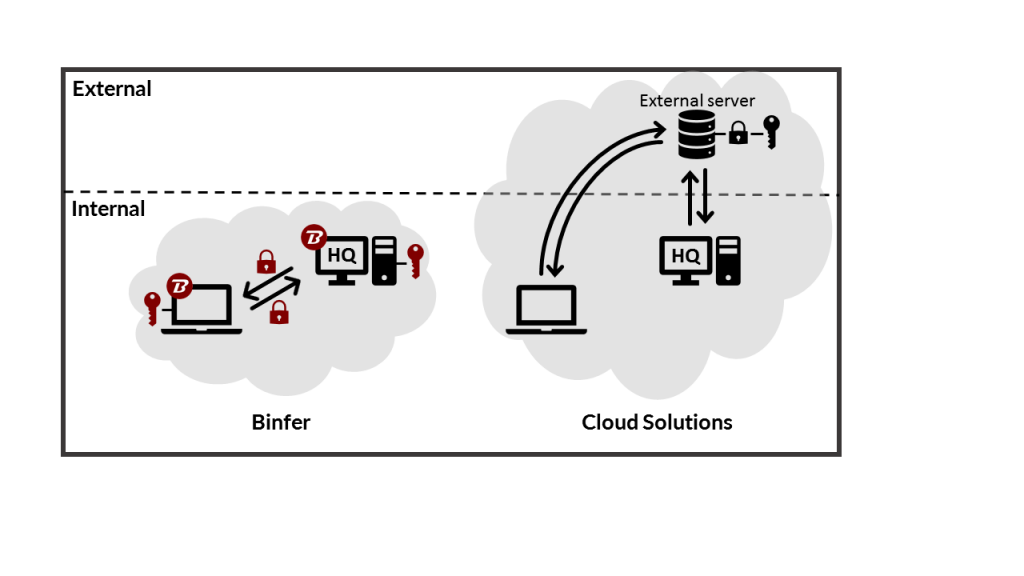Private Cloud File Sharing for Corporations: Enhancing Security and Efficiency
Exploring the realm of private cloud file sharing for corporations opens up a world of enhanced security measures and streamlined data management. In today's digital landscape, ensuring the confidentiality and accessibility of sensitive corporate files is paramount. Let's delve deeper into the nuances of private cloud file sharing and its impact on modern business operations.
Overview of Private Cloud File Sharing for Corporations

Private cloud file sharing refers to the practice of storing and sharing files within a secure, internal network that is accessible only to authorized users within a specific organization. This allows for seamless collaboration and communication while maintaining full control over sensitive data.Secure file sharing is crucial within a corporate environment to protect confidential information, intellectual property, and other sensitive data from unauthorized access or cyber threats.
By utilizing private cloud solutions, companies can ensure that their files are encrypted, backed up regularly, and accessible only to employees with the proper permissions.
Comparison with Public Cloud Alternatives
When comparing private cloud file sharing with public cloud alternatives like Dropbox or Google Drive, the main difference lies in the level of control and security. While public cloud services are convenient and cost-effective, they may pose a higher risk of data breaches due to the shared infrastructure and potential vulnerabilities in third-party systems.On the other hand, private cloud solutions offer greater customization, scalability, and security features tailored to the specific needs of a corporation.
This includes the ability to set granular access permissions, monitor user activity, and comply with industry-specific regulations or compliance standards.In conclusion, private cloud file sharing provides corporations with a secure and reliable platform for managing their data and collaborating effectively while mitigating the risks associated with public cloud services.
It allows organizations to maintain confidentiality, integrity, and availability of their files, ensuring business continuity and compliance with data protection laws.
Benefits of Private Cloud File Sharing
Private cloud file sharing offers numerous advantages for corporations looking to securely store and share their data. One of the key benefits is the enhanced data security provided by private cloud solutions. Additionally, private cloud file sharing allows for scalability and customization options to meet the specific needs of each organization.
Enhanced Data Security
Private cloud file sharing ensures that sensitive corporate data is protected from unauthorized access. By storing data on a private cloud server, corporations can control who has access to their files and implement advanced security measures such as encryption and multi-factor authentication.
This level of security helps to prevent data breaches and ensure compliance with data protection regulations.
Scalability and Customization
Private cloud file sharing solutions offer scalability, allowing corporations to easily expand their storage capacity as their data needs grow. This flexibility ensures that organizations can adapt to changing business requirements without the need for significant infrastructure investments. Furthermore, private cloud solutions can be customized to meet the specific security and compliance needs of each corporation, providing a tailored approach to file sharing that aligns with their unique business goals.
Implementation of Private Cloud File Sharing

Setting up a private cloud file sharing system for corporations involves several key steps to ensure smooth integration and secure access to files.
Setting Up a Private Cloud File Sharing System
- Choose a private cloud file sharing platform: Select a platform that meets the security and collaboration needs of your organization, such as Dropbox Business, Google Workspace, or Microsoft OneDrive for Business.
- Configure access controls: Define user permissions, encryption settings, and authentication methods to restrict access to sensitive files and data.
- Integrate with existing systems: Ensure seamless integration with existing corporate infrastructure, such as Active Directory or single sign-on solutions, to streamline user management.
- Set up file synchronization: Enable automatic file synchronization across devices to ensure employees have access to the latest version of files anytime, anywhere.
- Implement data backup and recovery: Establish regular backups of files stored in the private cloud to prevent data loss and enable quick recovery in case of emergencies.
Popular Private Cloud File Sharing Platforms
- Dropbox Business: Offers secure file storage, collaboration tools, and advanced sharing options for corporate users.
- Google Workspace: Provides cloud-based file storage, real-time collaboration, and integrated productivity apps for businesses of all sizes.
- Microsoft OneDrive for Business: Enables secure file sharing, offline access, and seamless integration with Microsoft 365 applications.
Best Practices for Integrating Private Cloud File Sharing
- Train employees on security protocols: Educate staff on best practices for sharing files securely and avoiding data breaches.
- Monitor file access and usage: Regularly audit file activity and user permissions to detect any unauthorized access or suspicious behavior.
- Implement strong encryption: Use end-to-end encryption and secure communication protocols to protect files in transit and at rest.
- Stay compliant with regulations: Ensure that your private cloud file sharing system meets industry-specific compliance requirements, such as GDPR or HIPAA.
Security Considerations for Private Cloud File Sharing

When it comes to private cloud file sharing for corporations, security is a top priority. Ensuring the confidentiality, integrity, and availability of data is crucial to protect sensitive information from unauthorized access or breaches.
Key Security Features in Private Cloud File Sharing
- End-to-end encryption: Encrypting data both in transit and at rest to prevent interception or unauthorized access.
- Access controls and permissions: Implementing granular controls to restrict access to files based on user roles and permissions.
- Activity logs and audit trails: Monitoring and tracking user activities to detect any suspicious behavior or unauthorized access.
- Data loss prevention (DLP) tools: Using DLP solutions to prevent the accidental or intentional leakage of sensitive data.
Encryption Protocols in Private Cloud Environments
One of the commonly used encryption protocols in private cloud environments is Transport Layer Security (TLS) for securing data during transmission. Additionally, corporations can also leverage Advanced Encryption Standard (AES) for encrypting data at rest stored in the cloud servers.
Tips for Ensuring Data Privacy and Compliance
- Regular security assessments: Conducting routine security assessments to identify vulnerabilities and mitigate risks.
- Employee training: Providing employees with cybersecurity awareness training to educate them on best practices for data protection.
- Compliance with regulations: Adhering to data protection regulations such as GDPR, HIPAA, or PCI DSS to ensure legal compliance and data privacy.
- Multi-factor authentication: Implementing multi-factor authentication for an added layer of security to verify user identities.
Last Recap
As we conclude our discussion on private cloud file sharing for corporations, it becomes evident that investing in secure data management solutions is crucial for fostering a productive and risk-free work environment. By leveraging private cloud technologies, businesses can safeguard their information assets while optimizing collaboration and workflow efficiency.
Stay informed, stay secure.